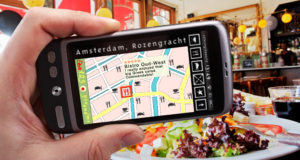 Between being a writer for a living and having this incredibly effusive personality, when my husband and I decided to move to Puerto Rico and start life anew living off the grid, there were a few aspects about this new life that seemed contradictory to living as our ancestors did. One of them, of course, being that our grandparents, who were farmers, didn’t have telephones, TVs or computers but relied on their radio to entertain and inform them. The other was that people then (just before the turn of the century and into the 1930s and ‘40s), generally speaking, didn’t move far from home. The concept of relocating to a new country and missing daily contact with family wasn’t really an issue for them.
Between being a writer for a living and having this incredibly effusive personality, when my husband and I decided to move to Puerto Rico and start life anew living off the grid, there were a few aspects about this new life that seemed contradictory to living as our ancestors did. One of them, of course, being that our grandparents, who were farmers, didn’t have telephones, TVs or computers but relied on their radio to entertain and inform them. The other was that people then (just before the turn of the century and into the 1930s and ‘40s), generally speaking, didn’t move far from home. The concept of relocating to a new country and missing daily contact with family wasn’t really an issue for them.
So, when we moved to Puerto Rico, computer in hand to write and Facebook account established to ensure regular check-ins with loved ones, we were as ready as we were going to be to leave those loved ones behind.
I am a Facebook addict. There I have admitted it! I am on it daily posting either funny things about our life (most of our family and friends continue to think we are a little nuts for giving up corporate America for life off the grid) or cracking wise about the lunacy of politics.
One day my husband, now a full-time farmer who, prior to our new life, spent 20+ years as an IT professional, says to me, “You’re on Facebook a lot. Are you being mindful of privacy?”
To me privacy meant not disclosing too many personal things about our marriage. I responded that of course I would never discuss intimate details of our marriage. I never did before, why would I start now?
A huge smile crossed his face. “Um…no, if I were to go on Google right now, type in your name, how much of your Facebook profile would I see? How many of your posts and responses to others’ comments would I be able to see? You need to be really careful about privacy. If not, you expose us both to hackers, the government, and people you don’t want knowing our business.”
My jaw dropped. I thought I was being private. In fact, I despise the thought that anyone can see anything about our life that I don’t happily expose on my own. I honestly did! However, unbeknownst to me, I unwittingly and continually exposed us to all kinds of potentially harmful acts against us. I had already put my Facebook on what I call, “lock down,” meaning that I set everything to friends only. But as I learned, that wasn’t nearly enough. So, without further ado, I will happily impart my husband’s words of wisdom with you so you too can continue to keep up with those in your life, but not risk exposure of your identity to do so.
Facebook Security Tips
Intrusive organizations spend lots of time trying to hack into and gather your personal information. But apart from the hackers, from time to time, some person, thinking he’s your friend – especially true for the women – becomes obnoxious and intrusive, hoping to be your closest friend. Neither is fun, both are invasive, and can ruin (at minimum) your mood and possibly your entire day and identity.
Here is what you can do to become as invisible as possible on Facebook in eight easy steps:
- Log into your Facebook page, click “Account” in the upper right corner of the page and click “Privacy Settings”
- The first heading is “Connecting on Facebook.” Click on the blue “View Settings” option.
- To be as invisible as possible, put all of the settings for every option to “Friends Only.” This means only your friends can search for you, connect with you and send you messages. When done, click “Back to Privacy” at the top of the page.
- Click on the blue “Customize settings” option at the bottom of the page.
- Click “Edit Settings” and set to “Only Me” for each option. Also, disable any settings such as “People Here Now.” This way, no one but you will be able to see your activity.
- Click “Back to Privacy” and scroll down to the bottom of the page under “Apps and Websites.” Click on the blue “Edit your settings” option.
- Scroll down to “Instant Personalization” and click on “Edit Settings.” Ignore the pop-up video that talks about how great instant personalization is, and uncheck the enabled box to disable this feature. You’ll get a pop up asking if you’re sure, and click “Confirm.” By turning this off, you’re blocking other websites from accessing your Facebook profile.
- Click “Back to Privacy,” scroll down to “Public Search” and click “Edit Settings.”
- Uncheck the “Enable public search” box. Now your profile is hidden from people searching for you on any search engine site.
Congratulations! You are now as invisible as you can possibly be on Facebook from everyone you don’t want knowing your personal information. By setting up your Facebook profile this way, only your Facebook friends will be able to interact with you, see your information, and know you exist. Rest assured, no prying eyes, supposedly even those in the government, can see anything about you without sending a friend request.
Twitter Security Tips
Twitter does not have as many security lock-down features as Facebook, so keep that in mind if you use the service. But don’t get discouraged! There are several things you can do to stay current with friends and loved ones on Twitter while still keeping away from prying eyes.
If you haven’t already, make sure your Twitter account is as private as possible. Log into Twitter and click on “Settings” in the upper right corner of your screen. Under the “Account” tab, check “Protect my updates,” and click “Save.” This protects your tweets from being displayed in the public timeline on Twitter, and it hides your updates from those who don’t follow your account.
- You can also alter certain settings on Twitter to protect your identity. Seeing as how you only want to interact with people you actually know, you can set your Twitter name to something other than your actual name and privately tell your friends what it is so that they know who you are online.
- Click on your profile name, click “Settings,” click “Profile Settings,” and then type in the name you want to use.
- You can also modify your location to just the country you are in, or leave it completely blank. It’s best not to add any website, email, or biography information if you want to be as private as possible. Search engines and hackers can find you through that information.
- In the “Account” tab, make sure the box under your e-mail address is unchecked so that hackers can’t find you through your email.
- Make sure the box for adding location tags to your tweets after “Tweet Location” is unchecked. If this is checked, anyone can see where you are tweeting.
- Check the boxes for protecting your tweets under “Tweet Privacy” so that only your followers can see what you post, and check the “HTTPS Only” box while you’re at it.
- Don’t forget to click “Save” after you make your edits!
Other ways to protect your privacy and help make sure your information is protected is to utilize the blocking features on both sites if you want to stop interacting with anyone, be sure to report any harassment or intrusive violations from other users to Facebook or Twitter, and change your password frequently.
More Security – The Dreaded Password
And on the topic of passwords, surely by now you know not to use passwords like your birth date, your spouse’s birth date, the date you two got married or other significant dates in your life. Those who do so are a hacker’s best friend. Indeed any of your children’s names will also be easily hacked. Hackers have more patience than you have time to try and restore your identity. Examples of excellent passwords are:
- If you got married in San Francisco, your password can be G0ldeng@te1 – it still is meaningful to you in that it signifies your favorite city, but who would think of an encrypted form of the Golden Gate Bridge as your password?
- If your favorite composer is Mozart, how about 1M*z@rt62 as your password?
- If your must use the names of your pets, kids or spouse, how about: L!mb@rger007?
Keep in mind with any social networking service, the best way to protect your privacy and hide your personal information from intrusive hackers is to be very careful about what you post on Facebook or tweet on Twitter. You have the best control about the things you put out on the Internet, so stay in touch with friends and loved ones but use caution when posting anything you wouldn’t want someone else to know.
Recall the parable in Luke – “a blind man cannot guide a blind man can he? Will they not both fall into the pit?” Now that you know how to protect yourself as best you can on Facebook and Twitter, be sure to tell your friends and loved ones so their information can be protected as well.
 Off The Grid News Better Ideas For Off The Grid Living
Off The Grid News Better Ideas For Off The Grid Living



